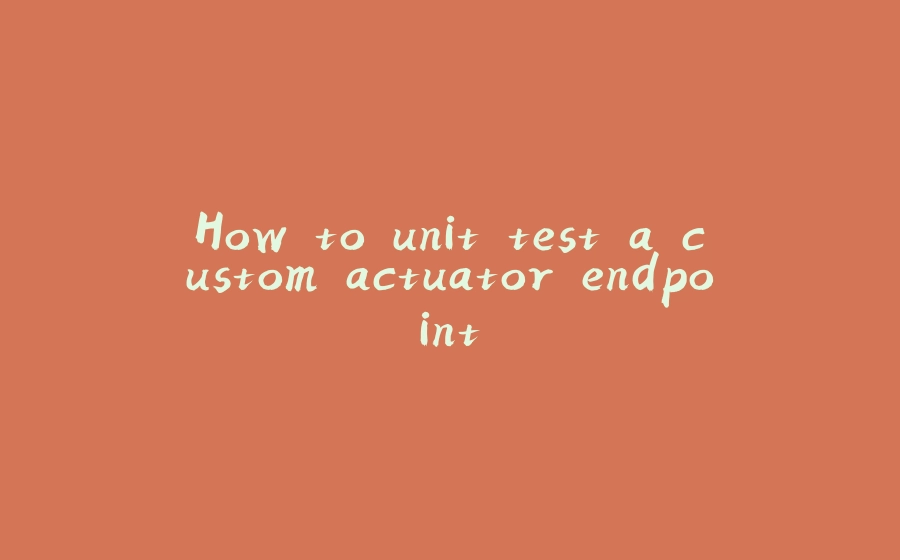Spring Boot Actuator (3 Part Series)
1 How to create a custom actuator endpoint to monitor Jira
2 How to unit test a custom actuator endpoint
3 Documents Spring Boot actuator endpoint with OpenApi
Previously, I posted on “How to create a custom endpoint to monitor Jira”, this is the second part, showing how to unit test this endpoint with SpringBoot MockMvc, Mokito and PowerMokito.
Here the list of dependencies required :
implementation 'junit:junit:4.12'
testImplementation('org.springframework.boot:spring-boot-starter-test') {
exclude group: 'org.junit.vintage', module: 'junit-vintage-engine'
exclude group: "com.vaadin.external.google", module:"android-json"
}
testImplementation group: 'com.konghq', name: 'unirest-mocks', version: '3.11.06'
testImplementation group: 'org.powermock', name: 'powermock-module-junit4', version: '2.0.9'
testImplementation group: 'org.powermock', name: 'powermock-api-mockito2', version: '2.0.9'
Enter fullscreen mode Exit fullscreen mode
We first need a class that load our configuration class used by the JiraConnectorService.
@TestConfiguration
public class TestConfig {
@Bean
public JiraConfig getJiraConfig(){
return new JiraConfig();
}
}
Enter fullscreen mode Exit fullscreen mode
Test the service to be sure it returns the good data according to the Jira endpoint response.
To do so, we need to mock the Unirest.get() call and response.
@RunWith(PowerMockRunner.class)
@PowerMockRunnerDelegate(SpringRunner.class)
@PrepareForTest(Unirest.class)
@Import({TestConfig.class})
@PowerMockIgnore({"javax.*.*", "com.sun.*", "org.xml.*"})
@SpringBootTest
public class JiraConnectorServiceTest {
@Mock
private GetRequest getRequest;
@Autowired
JiraConnectorService jiraConnectorService;
@Autowired
JiraConfig jiraConfig;
@Test
public void getResponseTimeTest() throws Exception {
JsonNode json = new JsonNode("{\"result\":10}");
HttpResponse<JsonNode> mockResponse = mock(HttpResponse.class);
when(mockResponse.getStatus()).thenReturn(200);
when(mockResponse.getBody()).thenReturn(json);
String mySelfEndPointUrl = jiraConfig.getHost() + jiraConfig.getApiPath() + JiraConnectorService.JIRA_MYSELF_ENDPOINT;
PowerMockito.mockStatic(Unirest.class);
when(Unirest.get(mySelfEndPointUrl)).thenReturn(getRequest);
when(getRequest.header(JiraConnectorService.HEADER_ACCEPT, JiraConnectorService.HEADER_APP_JSON)).thenReturn(getRequest);
when(getRequest.basicAuth(jiraConfig.getUser(), jiraConfig.getPassword())).thenReturn(getRequest);
when(getRequest.asJson()).thenReturn(mockResponse);
ResponseTimeData data = jiraConnectorService.getResponseTime();
Assert.assertEquals(HttpStatus.OK.value(), data.getHttpStatusCode());
Assert.assertTrue(data.getTime() > 0);
}
Enter fullscreen mode Exit fullscreen mode
We have to use PowerMockito and @RunWith(PowerMockRunner.class) annotation to mock the static method Unirest.get(..).
We can only use one @RunWith annotation, that’s why we add @PowerMockRunnerDelegate(SpringRunner.class) to load the Spring context.
Then test the endpoint :
@RunWith(SpringRunner.class)
@Import({TestConfig.class})
@AutoConfigureMockMvc
@SpringBootTest
public class RestJiraEndPointTest {
private static final String ACTUATOR_URI = "/management";
@MockBean
private JiraConnectorService jiraConnectorService;
@Autowired
private MockMvc mockMvc;
@Test
public void healthDtl_DOWN() throws Exception {
ResponseTimeData data = new ResponseTimeData();
data.setTime(-1);
data.setHttpStatusCode(HttpStatus.SERVICE_UNAVAILABLE.value());
data.setMessage("Service unavailable");
Mockito.when(jiraConnectorService.getResponseTime()).thenReturn(data);
RequestBuilder requestBuilder = MockMvcRequestBuilders.get(ACTUATOR_URI + "/jira/healthDtl")
.accept(MediaType.APPLICATION_JSON);
this.mockMvc.perform(requestBuilder)
.andDo(MockMvcResultHandlers.print())
.andExpect(MockMvcResultMatchers.status().isOk())
.andExpect(MockMvcResultMatchers.jsonPath("$.status").value("DOWN"));
}
@Test
public void healthDtl_UP() throws Exception {
ResponseTimeData data = new ResponseTimeData();
data.setTime(235L);
data.setHttpStatusCode(HttpStatus.OK.value());
data.setMessage("Ok");
Mockito.when(jiraConnectorService.getResponseTime()).thenReturn(data);
RequestBuilder requestBuilder = MockMvcRequestBuilders.get(ACTUATOR_URI + "/jira/healthDtl")
.accept(MediaType.APPLICATION_JSON);
this.mockMvc.perform(requestBuilder)
.andDo(MockMvcResultHandlers.print())
.andExpect(MockMvcResultMatchers.status().isOk())
.andExpect(MockMvcResultMatchers.jsonPath("$.status").value("UP"))
.andExpect(MockMvcResultMatchers.jsonPath("$.responseTimeMs").value("235"));
}
}
Enter fullscreen mode Exit fullscreen mode
I first tried to use @WebMvcTest(RestJiraEndPoint.class) instead of @SpringBootTest but without success. Spring seems to not recognized @RestControllerEndpoint as a rest controller. So, you have to use @SpringBootTest and @AutoConfigureMockMvc.
Spring Boot Actuator (3 Part Series)
1 How to create a custom actuator endpoint to monitor Jira
2 How to unit test a custom actuator endpoint
3 Documents Spring Boot actuator endpoint with OpenApi


























暂无评论内容